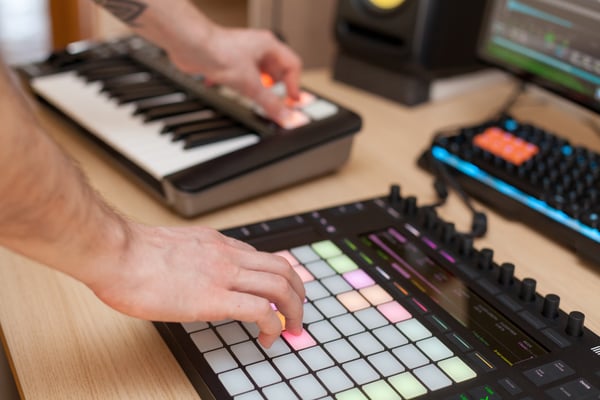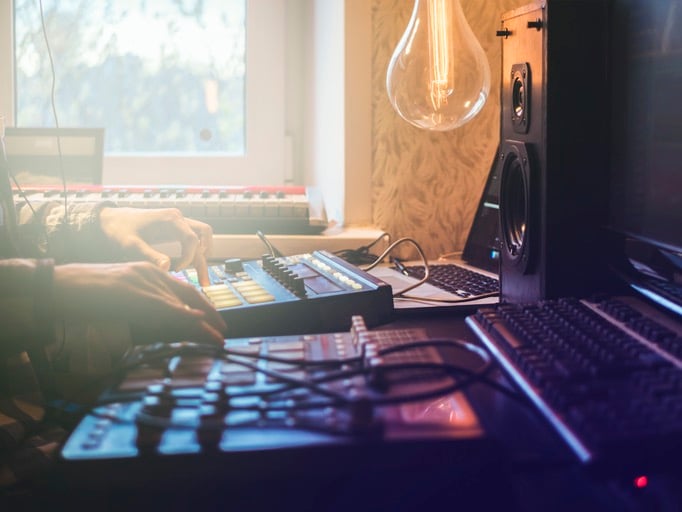Drum Programming Tips
Recording live drums can be a process that not everyone has the time to learn. Many musicians and producers wish they could have amazing live drums on their track, but it’s just not always possible.
Usually, you’ll need a nicely treated room with microphones that can be positioned in various, specific areas. As you can imagine, this doesn’t really work for the beginning or bedroom producer.
A great way to still have great drums in a track is by using sampled drums or MIDI drums.
While it can be noticeable when someone doesn’t record live drums on a track, it doesn’t mean that it has to sound lacking. With the right mindset, skillset, and approach, you can make MIDI drums sound just about as good as live drums.
How do you accomplish that? Keep reading for our five tips below.
Here are Five Tips to Help Your Drums Sound More Real!
Use Quality samples or VSTs
Make sure to take some time and do some research regarding VSTs.
Using poor samples can immediately start you off on a bad note, so having a quality VST along with great drum samples will set you up for success during your whole process. You don't want to fight a constant uphill battle due to a weak VST.
Many VST’s will use live recorded samples of drums, which will leave you with some stellar sounding drums right out of the box.
A couple of good drum VST’s are Addictive Drums and Superior Drummer.
Superior Drummer gives you a plethora of different drum styles as well as drum kits. Even after you have your drum kit in place, you can load in MIDI loops for the kit that will get your creative process brewing quicker than ever before.
Velocity
Velocity is one of the most important tools in making MIDI drums sound more real. If you play a ¼ note steadily, it will sound pretty boring.
But, what is velocity? Velocity is essentially the volume at which a specific MIDI note sounds.
Velocity ranges from 0 to 127, so use this wide range to your advantage. For example, a snare roll leading into a chorus can be programmed to start at 50 and go all the way to 127.
This will let the listener feel some anticipation instead of being blown away by the same velocity of the snare playing over and over.
Think Like a Drummer
One common mistake is when there are too many drums being played at once. Drummers only have two arms and feet just like everyone else.
You’ll want to think like a drummer when programming these drums. The drummer won't be able to hit every note with the same strength, so you may have to play your air drums in order to feel how your drums should sound.
Also, they can’t hit a snare, cymbal, tom, and percussion at the same time since they only have two hands.
Usually, keeping things simpler on the drum side will make for the listener to follow along easily.
Use Groove

Almost every DAW out there will allow you to insert a groove to your individual track.
Groove will change the velocity, as well as the timing, for your track. If you are looking for your drums to have some more swing, you can input the MIDI straight and then apply the groove effect to give your track some more bounce.
The great part about adding groove is that there are so many to choose from so you aren’t limited to a few different styles.
Don't Over Loop
If you are using the same loop of drums throughout the whole track, it will become boring very quickly.
Listen to some songs you like and pay close attention to the drums. Follow along and see how they change for each section of the song. Even try to re-create the beat so you can visually understand what is changing as well.
Hold out on some cymbals in certain parts of the song to make sure when you reach your climax the listener will be completely blown away.
Start Perfecting Your Mix
These tips are guaranteed to get your drums sounding more real and to give you diversity from other musicians!.
Programming MIDI drums to sound real will take time so make sure you go into it with some patience. Your next song is bound to be taken to another level and we hope these tips have helped!
Separate From the Crowd
If you want to learn the skills necessary to take your mixes and tracks to the next level, you need to check out the Atlanta Institute of Music and Media.
AIMM helps students fast-track their music industry career by offering valuable programs such as the Music Production and Audio for Media Associate Degree and the Certificate in Music Production.
Don't delay your music production passion any longer! Click the banner below and discover how the Atlanta Institute of Music and Media can help you achieve your goals today.
Additional Reading:













